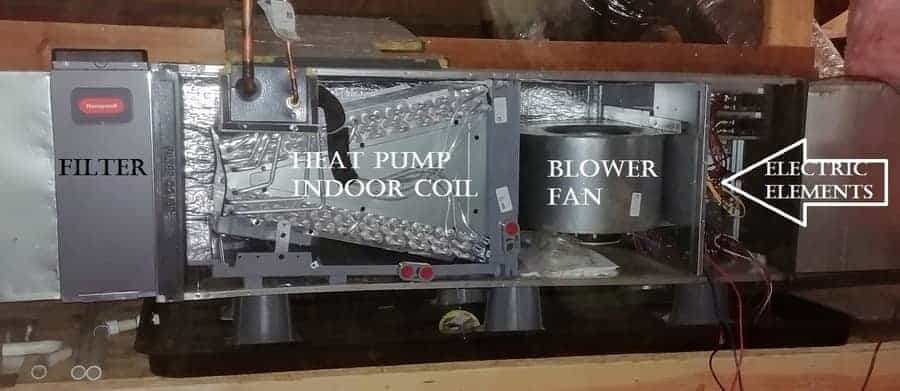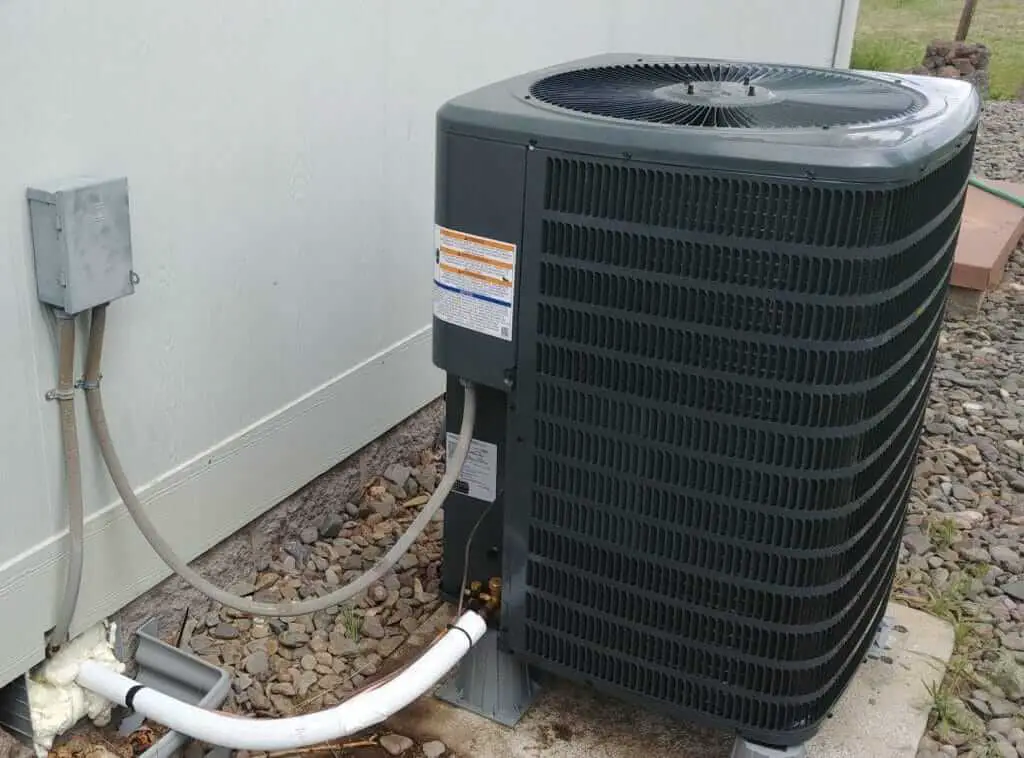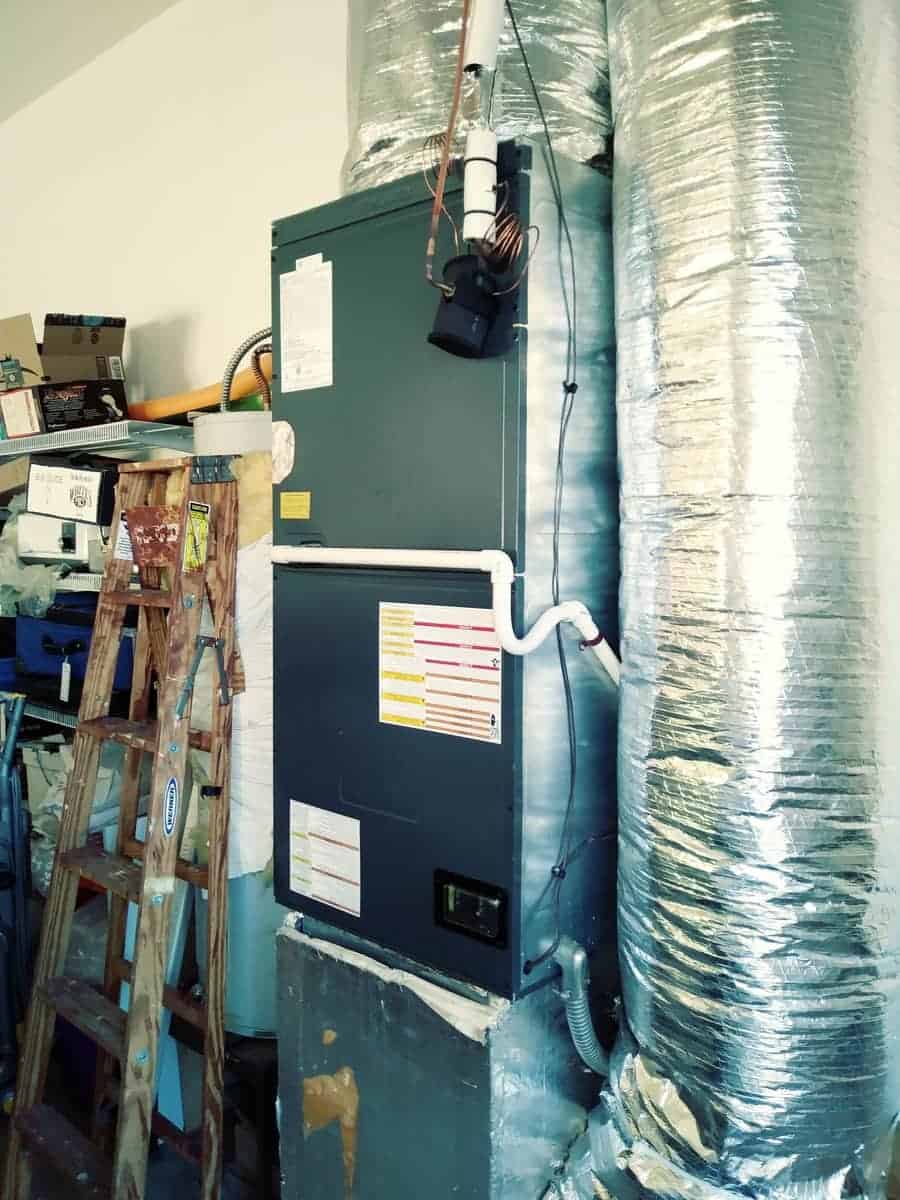I hope I can answer your heat pump heating questions. The terminology can get quite confusing.
A heat pump furnace is the section of a heat pump that moves the air through the duct work. It can be an electric, gas, or an oil furnace. This furnace would be located in the house attached to the duct work. Commonly called a “split system” because a heat pump has an outdoor and an indoor unit.
Conversely, you could have a package unit. Package units are not split. All components are in one. They generally set outside on the ground or on the roof and duct work is attached penetrating the building.
It wouldn’t fit properly to say a package unit had a heat pump furnace. It’s a complete system in a package. Just add duct work.

Neat thing about electric furnaces is that they are multi positional. Up flow, down flow, or horizontal as pictured.
Like in the image above I could have installed this heat pump furnace in any of those directions but horizontal fit the ticket for this residential air handler in attic with limited head room.
A heat pump furnace will have a heat pump tied to it. Literally tied to it in fact. See in the image above, the copper tubing going up above the “indoor coil”? That copper tubing is what connects the actual heat pump to the heat pumps furnace or as we prefer to call it the “air handler”.
Because it handles the indoor air for the heat pump system.

. Notice the white line leaving the heat pump (outdoor unit)? That’s insulation over copper.
That’s the other end of the copper line that literally connects the heat pump furnace to the compressor unit pictured to the left.
These copper line of which there are two, are filled with Freon. I called it Freon because that’s what most people call it.
Freon is a brand name. The actual stuff that is in those lines is refrigerant. We used to call it freaky frost.
Can A Heat Pump Be Used With A Gas Furnace?
I love this combination. It’s called “dual fuel”. You get to have the best of both worlds, or I should say three worlds.
Warm heat from a gas furnace in the freezing winter.
Cooling from the heat pump in the hot sweltering summers.
And in all those moderate days in the fall and spring, you can use the cheaper or more efficient heat from the heat pump.
In moderate weather a heat pump can create sufficient heat and maintain a comfortable temperature.
The characteristics of a heat pump are that they don’t produce as much heat as the outdoor temperature plummets below freezing. By incorporating the right controls you can switch from heating with the heat pump to a heat pump furnace with gas backup furnace.
The temperature of the air coming out of your registers using a heat pump in below freezing weather can be in the 90 degree range.
A sort of chill factor takes place with air moving at that temperature. It still can heat a home but some people that are used to the hot air from a gas or oil furnace seem to complain.
During those low temperature days it just feels better to have the backup heat be a gas furnace. An electric furnace can be that backup heat just as well, but at a cost.
This can vary with utility rates.
Can A Heat Pump Be Replaced With A Gas Furnace?
Also referred to as a hybrid system. Using an air to air heat pump with an alternate source for backup or auxiliary heat
This sort of sounds like the last question. But consider this heat pump furnace replacement idea. My next job is a customer that has an old heat pump that is still working well but he wants to convert to gas.
So we are taking out the heat pump furnace which is electric and replacing it with a new 97% efficient gas furnace.
These people are tough. They only used cooling for half a day last summer. Our summers can get pretty warm. Mine cooling unit came on daily. I don’t know how they stand it. Especially with a two story house and bedrooms on the top floor.
So I’ll replace his electric furnace and keep the heat pump outdoor unit and reinstall the indoor coil only, on to the gas furnace.
He’s eventually looking at some high costs in repairs for that old Rheem heat pump. By using it as an AC only unit it will extend the life dramatically.
Average life of a heat pump is about 15 years. His is already beyond that, but we think it will be worth keeping considering his infrequent use of cooling and never using the heat cycle again.
What About A Heat Pump Oil Furnace Combo?
It’s not much different from using a gas furnace or a heat pump propane furnace combo. You should use the fuel that fits your application. Oil prices are very temperamental with world issues impacting it’s value.
You could even install a heat pump wood furnace combo if you want to punish yourself cutting or buying wood and hauling it. But, then again I know some people that love cutting wood.
Propane can be a feasible option when natural gas in unavailable. One trick in getting good prices for propane is to purchase your own tank.
By owning your own propane tank you can shop for prices. When you rent your tank and go on auto refill you are subject to the price of your vendor.

